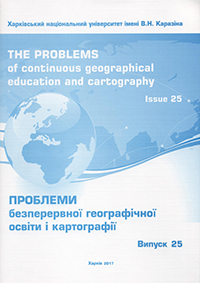The concept of the falsified map as an integrated element of information society
Abstract
The article deals with falsified cartographic works as misinformation of a person. They are increasingly encountered with an increase in the volume of information and the complexity of verifying its authenticity. With the help of the map, the scale increases from the local to the world level, where the interpretation of the cartographic work can be any due to a lack of geographical education. While before the XVIII century the maps contained secret information and it was necessary to obtain access to them, in the XIX-XX centuries maps became an element of manipulation. The most striking example of counterfeiting is the UK’s exit from the EU. There are many terms that characterize such maps: aggressive, underfilled, misinformation, false, falsified, where each of the terms has a fairly different meaning. Aggressive maps are created to propagate certain political views, and the false ones are often the result of an error or a human factor. Underfilled maps are informal, created for a certain occasion, existing for several days. Misinformation was used as an element of false information for misleading a certain part of the population, often used in the media. Among all the synonyms, the term «falsified» is the most ancient in use and broad in content. Its interpretation is given by practically all the dictionaries of the last two centuries. The expediency of using the notion «falsification» for similar cartographic works has been analyzed. It has been established that synonyms defining a map with an incorrect interpretation are: a distortion of information, the mismatch of exact content, the most correct use of the concept «falsified». Thus, a falsified map is a mathematically defined, diminished, generalized image of the Earth’s surface, of another celestial body or outer space, which shows objects located or projected therein in the adopted system of symbols, created or fake to the original with preservation of the appearance, with a mercenary purpose and saturated with a distorted, incorrect interpretation of phenomena, events, facts, which appears credible and does not correspond to the exact content.
Downloads
References
2. Salishhev, K.A. (1990). Kartovedenie [Cartography]. Moskva: Izd-vo MGU, 400.
3. Shevchenko, V.O. (2007). Dy`vosvit geozobrazhen`[Wonderland of geo-images]. Ky`yiv: Nika-Centr, 252.
4. Monmonier, M.S. (1996) How to lie with maps. Chicago: The University of Chicago Press. 126.





